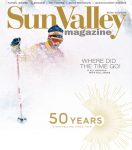Never give up was her motto last winter, and it paid off.
Persevering against the odds put Ketchum resident Kim Verde, 57, in the winner’s circle, to her surprise and delight. On April 9, 2006, Verde won a Federation of International (FIS) Skiing World Cup in her age group, beating two Italian skiers she said were better than she. “I thought I would never be first in the World Cup, but figured I’d try anyway,” said Verde, a homeowner in West Ketchum for 14 years.
FIS Masters Cup competition scores the top seven races for its members, tossing out the poor showings if a racer has more than seven finishes. FIS races in Super Giant Slalom, Giant Slalom and Slalom categories all count.
Verde said she went to Europe four times and raced in Canada to achieve more than seven races. Although she placed only fifth in Bischofswiesen, Germany, and at Courmayeur in the Italian Alps, she had four first-place finishes and three seconds as best placements and that beat out the two Italians.
Twenty-two racers were in her category. Annaliese Zipperle, Italy, placed second in the 55-59 age group, and Dina Gamba, Italy, took third. Verde stood between them to receive her World Cup trophy.
It was quite an honor for a woman who didn’t take up skiing until she was 48 years old. She got there on a strong athletic foundation though. She was a USFSA Gold Medalist in Figures and Free Skating, a former Holiday on Ice performer, USTA National Women’s tennis competitor and crew member on a 70-foot sloop for the Vic-Maui International Yacht Race.
When she took up skiing, she applied the same dedication she brought to earlier athletic competitions in her life.
Verde has an education degree from Western Washington University and a master’s from Boise State University and is certified to teach, but she considers herself retired. Her late husband owned a large company which ran nursing homes. Clearly, Verde was ready for a new challenge when she took up racing nine years ago.
She said Sun Valley Ski School instructors pushed her toward racing after she signed up for a Master’s class. “I haven’t looked back,” Verde said. “I kept moving up and kept racing.”
She started training in September 2005 in Valle Nevado, Chile, racing morning and afternoon to get in shape for competition. Large numbers of North American racers compete in a sanctioned FIS race there. In that location, she placed second in GS and second in Super G. She credits her dedicated training with the final win. >>>
“I knew I wasn’t the fastest racer,” Verde said. “I knew I needed to compete in more races to have a chance to win.”
Finishing enough races to qualify for a World Cup, she said, is harder than it looks. For instance, during the winter last year, she had to rent skis to race in Abetone, Italy, after a flight diverted in Salt Lake City and a snowstorm in Milan, Italy, separated her from her luggage for days. In addition, races are often cancelled due to bad weather. “All these masters had arrived and the road was closed,” Verde said of a scheduled race in Austria last year. Racers waited to ski the Kaunterthaler Glacier in Austria near the German border but lost that opportunity when the road became impassable. For another race, her flight to Italy was diverted and she missed the start time.
Mountains in winter are unpredictable, making races equally hard to predict. A certain amount of stamina is needed at all times. As an example, in Austria, at one of the largest training areas, Hintertux, racers reach the top by riding three gondolas to connect with the glacier.
Verde remained dedicated, and skied even in terrible foggy conditions on Limone Piemonte in an area known as the Alps of the Riviera.
“My goal was to be one, two or three in every race,” Verde said. “You can’t go any higher than FIS races.”
Doctors, lawyers and professionals are in her category. They choose their vacation time for races. Verde sponsors herself, and last winter devoted all her time and money to the competition. “When I first got home I was just exceedingly tired,” she said. “Now I feel some self-satisfaction for having trained and put up with bad weather, cancelled races—and ski lengths I’m not comfortable with that were enforced by the FIS. I went into it thinking I’ll give the seven series a try and see where I land.”
Verde said the win was a surprise and her trophy was one of the most beautiful she’d ever seen. “The trophy is a beautiful crystal ball, and there is a small snowball inside.” Verde said. “It’s almost like a kaleidoscope when you look into it.”
Verde said if she never wins another World Cup, she’ll have her one win in 2006. “This is a triumph for me,” Verde said.

